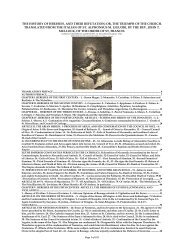The Writings of St. Francis of Assisi - + Saints' Works
The Writings of St. Francis of Assisi - + Saints' Works
The Writings of St. Francis of Assisi - + Saints' Works
You also want an ePaper? Increase the reach of your titles
YUMPU automatically turns print PDFs into web optimized ePapers that Google loves.
THE WRITINGS OF ST. FRANCIS OF ASSISI<br />
<strong>The</strong> Exposition <strong>of</strong> the Our Father<br />
[ExpPat]<br />
Expositions or commentaries on the Our Father were very common in the Middle Ages as an aid to<br />
meditation. For <strong>St</strong>. <strong>Francis</strong> the Our Father was a very important prayer, since it was his decision to take<br />
God as his Father that led him to dramatically renounce his own inheritance in the piazza <strong>of</strong> the Episcopal<br />
residence at <strong>Assisi</strong>. <strong>St</strong>. <strong>Francis</strong>' exposition <strong>of</strong> the Our Father manifests more clearly than any <strong>of</strong> his<br />
writings the clarity and pr<strong>of</strong>undity <strong>of</strong> his grasp <strong>of</strong> spiritual realities.<br />
According to some sources, <strong>St</strong>. <strong>Francis</strong> taught his friars to recite this prayer. 216 Indeed, it is most useful as<br />
an aid to recollection. <strong>The</strong> date <strong>of</strong> composition is unknown. 217<br />
O Most Holy "Our Father:" Creator, Redeemer, Consoler and Our Savior. 218<br />
"Who art in Heaven:" in the Angels and in the Saints; enlightening them unto knowledge,<br />
because Thou, Lord, art Light; inflaming them unto love (amor), because Thou, Lord, art Love;<br />
indwelling and filling them unto blessedness, because Thou, Lord, art the Highest Good, the<br />
Eternal One, from whom is every good, without whom nothing is good.<br />
"Hallowed be Thy Name:" may the knowledge <strong>of</strong> <strong>The</strong>e in us be made bright, so that we<br />
may know, what is the breadth (cf. Ep 3:18) <strong>of</strong> Thy benefactions, 219 the length <strong>of</strong> Thy promises,<br />
the sublimity <strong>of</strong> Thy Majesty and the depth <strong>of</strong> Thy judgments.<br />
"Thy Kingdom come:" so that Thou may reign in us by grace and makes us come unto<br />
Thy Kingdom, where vision <strong>of</strong> <strong>The</strong>e is made manifest, love (dilectio) <strong>of</strong> <strong>The</strong>e made perfect,<br />
company with <strong>The</strong>e blessed, enjoyment <strong>of</strong> <strong>The</strong>e everlasting.<br />
"Thy will be done on earth as it is in Heaven:" so that we may love <strong>The</strong>e with (our)<br />
whole heart (cf. Lk 10:27) by thinking <strong>of</strong> <strong>The</strong>e always, with (our) whole soul by desiring <strong>The</strong>e<br />
always, with (our) whole mind directing unto <strong>The</strong>e all our intentions, by seeking Thy honor in all<br />
things and with all our strength by expending all our strength and sense <strong>of</strong> soul and body in<br />
submission to Thy love (amor) and not in anything else; and may we love our neighbors even as<br />
our very selves by drawing all to Thy love to the extent <strong>of</strong> (our) strength, by rejoicing over the<br />
good things <strong>of</strong> others just as over our own and by compassionating (them) in evils and by giving<br />
<strong>of</strong>fense to no one (cf. 2 Cor 6:3).<br />
"Give us this day," Thy Beloved (dilectio) Son, Our Lord Jesus Christ, "our daily Bread:"<br />
to remember and understand and reverence the love (amor), which He had for us, and those<br />
things, which He said, did, or endured on our behalf.<br />
"And forgive us our debts:" by Thy ineffable mercy, through the virtue <strong>of</strong> the Passion <strong>of</strong><br />
observe the moral law is signified.<br />
216 cf. K. Esser, pp. 342. It should be noted that the association <strong>of</strong> this prayer with "<strong>The</strong> Praises to<br />
be said at every hour" [LaudHor] is very doubtful, cf. ibid. pp. 352-4.<br />
217 K. Esser, p. 352. This Exposition is divided by K. Esser into verses according to its respective<br />
paragraphs.<br />
218 <strong>St</strong>. <strong>Francis</strong> addresses the Father with the titles "Redeemer, Consoler and Our Savior," because<br />
all the work <strong>of</strong> God in creation is rooted in the unified action <strong>of</strong> the Persons <strong>of</strong> the Trinity, and<br />
thus can be attributed to each. Properly speaking, however, the Son is called "Redeemer, and Our<br />
Savior," and the Holy Spirit, the "Consoler."<br />
219 i.e. gifts; "benefaction" is the customary term for a gift given to a religious community by a<br />
benefactor.<br />
Page - 56













